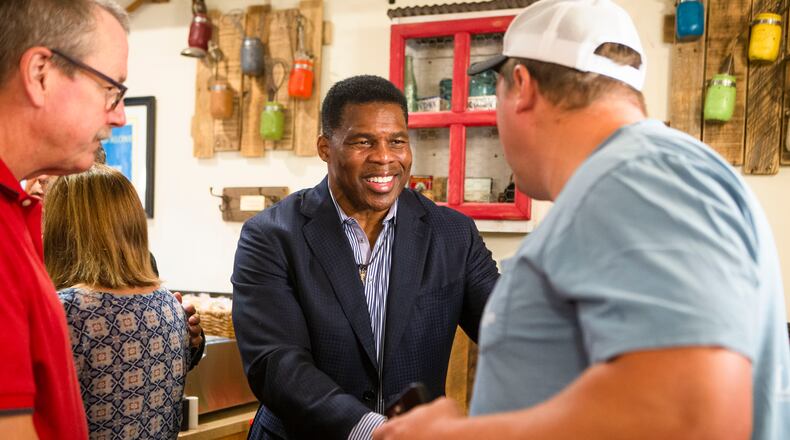While Georgia Democrats celebrated the state’s decisive role in passing a major legislative package to combat climate change and curb drug prices, Republican leaders promised that they would pay at the ballot box for their embrace of President Joe Biden’s domestic agenda.
Even before Senate Democrats united to pass the legislation over GOP opposition, Gov. Brian Kemp and Republican Senate hopeful Herschel Walker hit the campaign trail to condemn the package as unfettered spending and more government interference at a time when inflation is hurting Georgians.
It’s part of an ongoing effort by Republicans to turn the November midterm into a referendum on Democratic control of Washington — and to slam U.S. Sen. Raphael Warnock and Stacey Abrams for backing what amounts to the largest investment to slow climate change in the nation’s history.
At stops last week in north Georgia and Atlanta’s suburbs, Walker declared the measure would “cripple American manufacturing.” And a supportive crowd cheered Kemp in Toccoa as he panned the package as a “new disaster” filled with reckless spending and tax hikes.
The bill, which is expected to get a vote in the U.S. House on Friday, allows Medicare to negotiate prescription drug prices with drug makers, requires big corporations to pay a minimum 15% tax on profits, extends subsidies under the Affordable Care Act for another two years, and includes a series of tax incentives to help with climate change.
Other Republican candidates are also campaigning against the package. At a cotton gin in the southwest Georgia town of Dawson, Republicans gathered to showcase Tyler Harper’s knowledge of farming issues and also vented about the tax increases in the bill.
Former U.S. Sen. Kelly Loeffler, on hand to boost Harper’s bid for agriculture secretary, said the measure would put “food security at stake” by imposing new regulations on farmers. Chris West, the GOP congressional nominee, lamented what he saw as federal overreach.
And Harper expressed concern that a measure that Democrats promise will combat inflation will only lead to higher prices, forcing farmers and Georgia families to struggle with the economic fallout.
The doom-and-gloom outlook contrasts with Democratic optimism. Warnock trumpeted that Georgia voters “made this possible” by electing him and U.S. Sen. Jon Ossoff in a runoff sweep that flipped control of the chamber. The package passed 51-50, with Vice President Kamala Harris breaking the tie.
The final version didn’t include Warnock’s bid to cap out-of-pocket insulin payments for those with private health insurance, a provision that was defeated by Republicans. But it will cap monthly insulin copays for Medicare beneficiaries at $35 per month, affecting more than 3.3 million people.
Abrams has used the initiative to tie herself more closely to Biden. She told CNN that it will help fill the gaps left by Kemp’s refusal to expand Medicaid and his “absolutely silent” plan to slow higher temperatures.
“It’s going to put money back into the pockets of Georgians, back into the pockets of Americans,” she said. “And that’s the type of progress we need to continue to make.”
The blanket opposition also means Republicans can’t claim credit for provisions in the bill designed to earn more broad-based support, such as provisions to extend healthcare subsidies and allow Medicare to directly negotiate the price of prescription drugs, which would lower costs in the long run.
At his Milton stop, Walker refused to say specifically whether he approves of Warnock-backed initiatives in the measure that would cap the price of insulin and curb the price of prescription drugs. More broadly, he said he does “support some of the good things he’s doing but that’s just a Band-Aid.”
“The problem we got: Why are we continuing to spend money we don’t have?” Walker said. “You know what having a credit card means when you have no money. Quit spending money. All we’re doing is spending money. They can’t continue tearing things up, not fixing one thing.”
About the Author
The Latest
Featured



